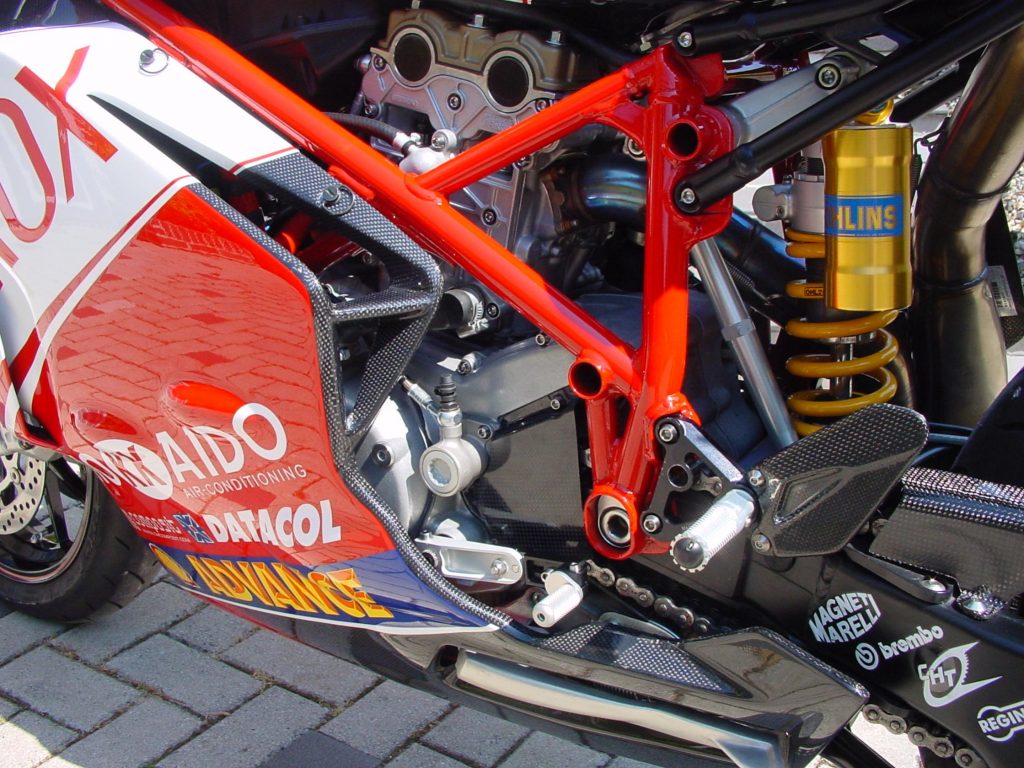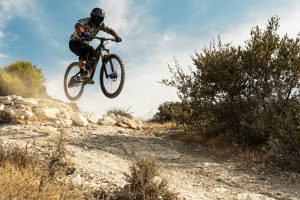
We’ve all been there. No matter how good you think you are, there’s someone that seems to be just that little bit quicker.
After a few corners, they’re as good as gone. How can it be? You’ve been nailing your body positioning, your entry and exit throttle, your tyres are warm too aren’t they?

There can be many reasons, but I’ll run you through a few that I’ve identified myself being a victim of and how I worked around them.
You’re target fixating
Target fixation can be a bitch. The same corner you’ve ridden around 100 times before could be the corner that brings you down the next weekend. Target fixation can be down to a few things. Myself, I have found these are the major factors for me:
- Tiredness – You’re tired and can’t be bothered moving your head and eyes to look well through/around the corner. Sounds crazy but that actually happens! You just end up zoning out and looking just ahead of your bike and not planning your corner exit correctly.
- Speed – You’re simply going too fast. You’re either panicking before the corner and worrying about or looking at what you could possibly run into or you’re looking nowhere but directly in front of you, hoping like hell that mashing the front brake down will make the road stop running out so quickly.
Some cures for target fixation:
- Tiredness – Before you go for a ride, fuel up. Guzzle down at least 1 glass of water, have some chocolate or even a sandwich of some sort. Then stay hydrated. I usually take a hydration bladder with me if I’m riding for more than an hour. It can be a lifesaver because most rides go on for way longer than planned for various reasons… The advantage of the hydration bladder is that you can drink from it even while riding, no need to pull a drink bottle out and lose the rest of the group. Something like this works well: Hydration Pack, wait for it to go on sale. Make sure you eat some carbs every few hours to keep the energy levels up too. Hot days can really drain your energy quick and a few carbs won’t make you fatter than you already are. Riding motorcycles is a workout if you’re doing it right!
- Speed – Pretty self explanatory really… I used to ride at a level where I’d think I was some kind of Street Rossi. I’d push the limit on every corner, balancing on the knife-edge between crashing and making the corner. Yet I was miles slower than so many riders I went out with. Something most riders (myself included at the time) don’t realise is that riding at 90% of your skill level can still mean you’re slower than someone who is faster on average that only rides at 50% of their skill level. Another way to think about it is you’re riding a $2000 150cc Yamaha at 90% of your ability and trying to achieve the same cornering speeds as someone riding a fully set-up GSXR-600, riding at 50% of their ability. The GSXR rider probably won’t even feel the bumps around a corner that cause your Yamaha to squirm, wiggle and shudder. The 150cc bike makes it just that much harder to ride quickly but also makes you put yourself in danger by pushing too hard on a bike that is inadequate. This doesn’t mean you should ride the GSXR-600 at 90% of your ability either because as the speeds go up, your margin for error reduces. The result if you were to fail your corner entry also becomes much worse with increasing speeds. I know this all sounds obvious, but sometimes you need to really break it down into its components to get the full effect. Riding very close to your limits will make you target fixate because you’re working overtime, your mind and body are under great amounts of stress. Slow in, fast out. Slow down for the corner, get your lines correct, get on the throttle earlier and fly out of that corner. You’ll eventually find the limits of the rear tyre rather than the limits of the front tyre and that is when you know you’ve got the idea of “slow in, fast out”.
Further tips:
“I’d say eat and hydrate 30 mins to an hour (at least) before travel because I’ve noticed many people including me react slower immediately after a meal, but the confidence levels are still high and sometimes the brain can’t keep up to our confidence in riding. Also, use the loo before you leave, you don’t want to struggle with gear at every stop or think about it when riding.” – Alaric F, Redline Riders – Bike Club
You’re worrying too much about surface contact
There’s been too many times I’ve hopped off my bike to regroup during a ride and felt that something is “off” today. Tyre pressure, gravel on the roads, suspension feels bad… We’ve all felt it. But the real common denominator is over-thinking. Over-thinking what the bike is doing, why the bike is doing what it is and trying to predict its behaviour. It’ll mess with your head when you should instead be focusing on how to tackle the next corner.
Sometimes, it’s best not to worry about your tyres and every single little bump, slip and slide. Just stay loose on the handlebars. Your bike is more capable of staying upright after a butt-clenching situation than you are. Don’t exert your wishes on the bike, let it do its own thing. Look at this: Motorbike with no rider, does its own thing. Doesn’t care about your feelings.

I’m not saying stop reading the road and fly into corners like this day is your last. I’m saying, before you enter a corner, have a look for any signs of road condition up ahead. If you’re in a corner, you should be going at a speed where you can adjust for the given situation. If you do misjudge something like a bump on the road, there’s no point worrying. Life isn’t smooth and neither is the road. You won’t necessarily come off if you hit gravel, but fighting your bike trying to bring it upright when you hit some gravel will definitely increase the chances of a crash. Be smooth, be controlled and carry out your actions without jerky movements. Bikes like to move smoothly.
You’ve adapted to your bike rather than adapting your bike to yourself

This is something that Dave Moss said and rings true since the first time I heard it years ago. Many of us don’t get our bikes set-up correctly and ensure it is at peak performance. Performance doesn’t degrade suddenly, it happens over time, over the course of months or years. Unless you take a long break from riding and get back on your bike, you won’t notice the subtle degradation in performance that holds you back. Worn suspension, worn bushings and bearings, chain and sprockets, incorrect tyre pressures… They all contribute to feelings of vagueness and instability when riding at speed.
Most of us will can never tell the difference between two clicks in on the rebound setting or even 1-2 PSI less on the front/rear tyres. But it all adds up. Do some pre-ride checks before all serious rides. At the very least do the basics:
- Chain tension check and adjustment.
- Tyre pressure check and adjust while cold, less than ~5-10 mins of riding. Even better if you fuel up first so they have more time to cool down, or even heat up to the ambient temperature.
- When changing suspension settings, make one change at a time and make sure you get a proper feel for any difference it may have made before changing other settings. It’s a fine art and you should really try make adjustments after riding through some corners that you’re very familiar and comfortable with so you know the difference in behaviour is attributed to the bike rather than yourself.
- Make sure your brakes are bled and working well, make sure your pads have meat left on them. Make sure your tyres are good! Nothing worse than going on a ride while having that nagging voice in the back of your head telling you that your bike isn’t 100%. It really messes with you and makes you doubt yourself before every corner.
I’m guilty of adapting to my bike rather than adapting my bike to myself, even to this day, because I can’t afford to do a full-blown service of everything on my bike all the time. There’s always something that needs servicing, be it fork oil a rear shock rebuild or just the rear tyre being a bit squared off after a lot of commuting. Unless you’re racing competitively, your bike is never truly 100%. But it doesn’t mean you can’t at least try and keep the bike well maintained by doing the basics. Old shock oil won’t be the death of you (having no shock oil probably will), but a tyre that overheats because your tyre pressure is too low can certainly cause you to slide out.
Conclusion

In conclusion, the main points to take away are:
- You should always be well prepared before your ride. Your body and mind should be well fuelled and alert for starters. I don’t think I’ve ever had a bad ride since I started ensuring I was well fed and watered prior to my big weekend rides.
- You should have your bike set-up well and all easily adjustable components such as chain and tyres should be set correctly. That nagging voice in the back of your head will slow you down!
- The best thing you can do is try and set yourself up for the corner well enough so you can adjust your position within the lane to account for any unexpected surprises. If you do however meet something unexpected like gravel, stop fighting your bike through the corner. Don’t try predict how the surface will make your bike behave. Our bikes want to stay upright. They will recover from instability on their own accord. Stay loose on the handlebars and let the bike sort itself out.
- Finally, don’t ride near the maximum of your ability on the road. By doing so, you tend to target fixate and panic before corners. This can lead to obviously severe consequences. You should be able to link each corner without much use of the brakes. That is true motorcycling Zen.
Finally remember this- There will always be someone that is faster than you. That’s just the way life is. You’re only as good as your last ride. No one will pat you on the back for your best rides but they sure as hell will remember your last crash for years to come.



I am a new rider and am enjoying it -I only got my bike 3 months now and this information will help me in corners thanks for the tips
Hey thanks for the feedback, I’m glad to hear the article helped you. I’ll post more things like this to help you guys out. You can also follow me on facebook to get updates as they happen if you like: https://www.facebook.com/riderscornernz/
Stay safe on the roads and always ride within your limits 🙂